
what soldiers do pdf
Soldiers are essential for national security, engaging in combat, peacekeeping, and humanitarian missions. Their duties include protecting citizens, maintaining order, and upholding ethical standards in service.
1.1. Overview of Soldier Duties and Responsibilities
Soldiers perform diverse roles, including combat, peacekeeping, and disaster response. Their responsibilities encompass tactical operations, training, and logistical support. Leadership roles involve guiding teams, while ethical conduct and moral obligations are paramount. Soldiers must adhere to military codes, ensuring trust and discipline within their units. Their duties extend beyond combat to community service and humanitarian efforts, reflecting their multifaceted contributions to national security and global stability.
1.2. Importance of Understanding Soldier Roles
Understanding soldier roles is crucial for effective military operations and societal support. It fosters accountability, ensures seamless coordination, and builds public trust. Recognizing their responsibilities highlights their contributions to national security and humanitarian efforts. This understanding also aids in recruiting and training, ensuring soldiers are prepared for diverse missions. Ultimately, it reinforces the significance of their service, both in combat and community engagement, ensuring a well-rounded appreciation for their multifaceted duties.
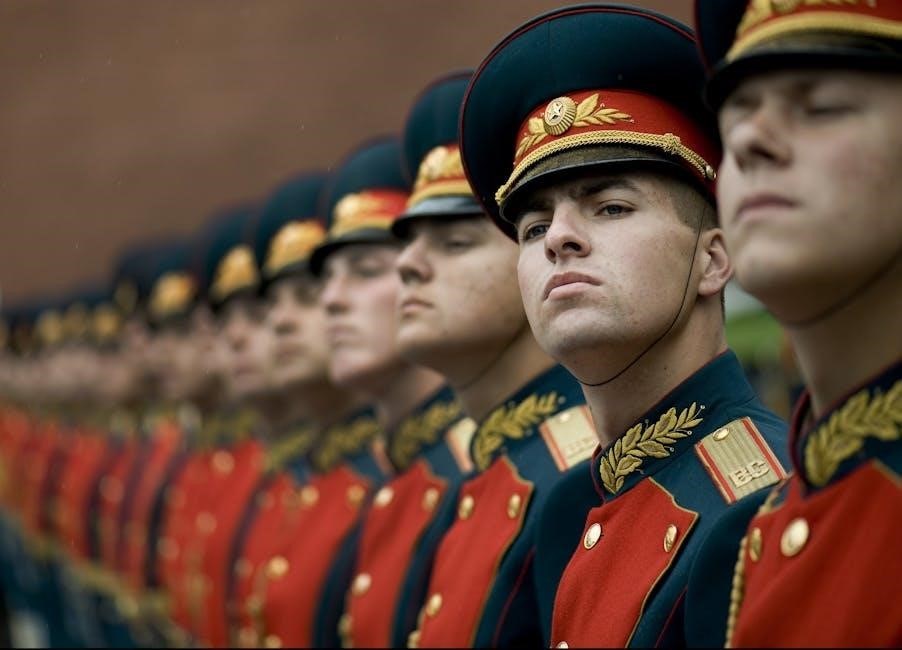
Core Duties of Soldiers
Soldiers engage in combat, tactical operations, and training while supporting logistical needs. They adhere to military codes, ensuring mission success and maintaining discipline in diverse roles globally.
2.1. Combat and Tactical Operations
Soldiers are trained to execute combat and tactical missions, ensuring national security. They engage in ground, air, and sea operations, employing strategic tactics to achieve objectives. Their roles include conducting patrols, securing territories, and neutralizing threats. Tactical operations require precise planning, coordination, and execution. Soldiers must adapt to dynamic environments, utilizing advanced weaponry and technology. Their ability to perform under pressure is crucial in safeguarding lives and maintaining global stability. Combat readiness and adherence to mission protocols are paramount in their daily operations.
2.2. Training and Skill Development
Soldiers undergo rigorous training to master essential skills, ensuring readiness for diverse missions. This includes combat tactics, weapon proficiency, and physical conditioning. Continuous education enhances their expertise, adapting to modern threats. Mentorship programs foster leadership development, preparing soldiers for advanced roles. Training simulations and practical exercises refine decision-making under pressure. Skill development is tailored to specific military branches, equipping soldiers with specialized knowledge. Ongoing learning ensures they remain capable of executing complex operations effectively, maintaining operational excellence and adaptability in dynamic environments.
2.3. Support and Logistics Roles
Soldiers in support and logistics roles are crucial for mission success, ensuring resources are efficiently managed. They oversee supply chains, maintain equipment, and coordinate transportation. These roles include managing ammunition, food, and medical supplies, ensuring operational readiness. Logistics specialists plan and execute the movement of personnel and materials, while maintenance crews keep equipment functional. Effective support roles enable combat units to focus on their objectives, highlighting the importance of behind-the-scenes contributions to overall mission success and national security efforts.
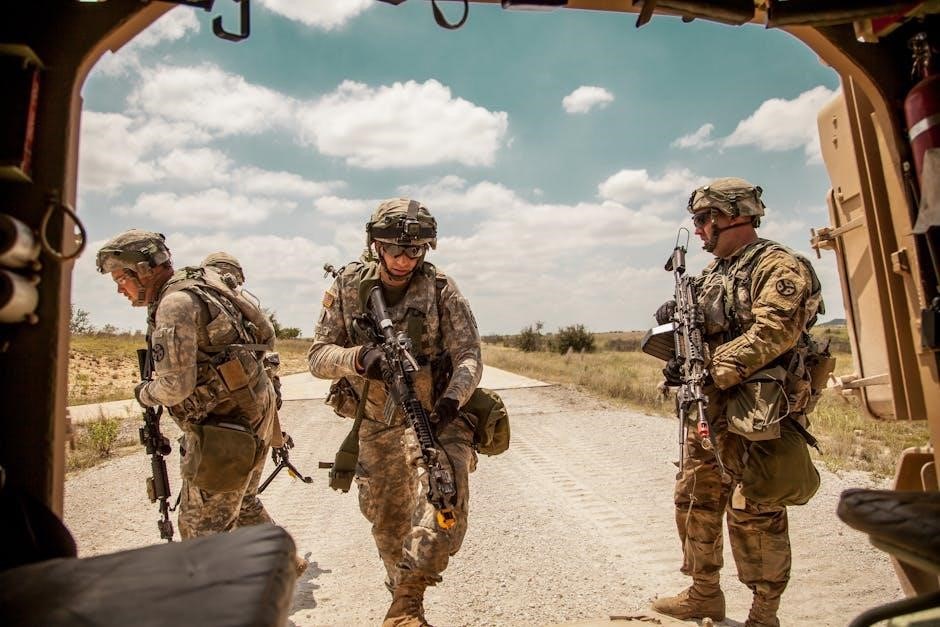
Leadership Roles in the Military
Military leaders inspire, guide, and make strategic decisions, ensuring mission success and fostering unit cohesion while mentoring soldiers to achieve organizational goals effectively.
3.1. Responsibilities of a Platoon Leader
A platoon leader is responsible for the tactical employment, training, and welfare of their unit. They plan missions, make strategic decisions, and ensure tasks are executed effectively. Leaders mentor soldiers, fostering discipline and teamwork while maintaining operational readiness. Their role includes conducting reconnaissance, coordinating logistics, and communicating with higher command. Trust and accountability are paramount, as they are accountable for their platoon’s successes and failures. Effective leadership ensures mission accomplishment and the development of competent, ethical soldiers capable of achieving organizational goals.
3.2. Role of Squad Leaders in Team Management
Squad leaders play a crucial role in team management by guiding and directing their squad members. They ensure tasks are completed efficiently, provide guidance, and maintain discipline. Leaders foster camaraderie and resolve conflicts, enhancing unit cohesion. They conduct training, assess performance, and prepare soldiers for missions. Squad leaders act as intermediaries between higher command and soldiers, ensuring clear communication and effective execution of orders. Their leadership directly impacts morale, operational readiness, and mission success, making them indispensable in both routine and combat situations.
3.3. Senior NCOs and Their Leadership Duties
Senior NCOs are pivotal in maintaining unit discipline and standards. They mentor junior leaders, ensuring adherence to military protocols and ethical conduct. These leaders oversee training programs, assess performance, and provide constructive feedback. Senior NCOs play a key role in strategic planning and decision-making, often serving as advisors to officers. They foster a culture of accountability and professionalism, inspiring soldiers to uphold the military code of conduct. Their experience and leadership are crucial in shaping the unit’s effectiveness and readiness for various missions and operations.
Military Training and Preparation
Military training ensures soldiers are physically and mentally prepared for duty. It includes skill development, tactical drills, and continuous education to enhance readiness for various missions and challenges.
4.1. Basic Training for New Recruits
Basic training is the foundation for new recruits, teaching discipline, physical fitness, and core military skills. It focuses on transforming civilians into capable soldiers, ready for advanced training and service, ensuring they understand their roles and responsibilities within the military structure.
4.2. Advanced Training and Specialization
Advanced training equips soldiers with specialized skills for specific roles, enhancing combat readiness and leadership abilities. It focuses on refining tactical expertise, technical knowledge, and mission-specific capabilities. Through simulations and real-world scenarios, soldiers gain proficiency in advanced weaponry, strategic planning, and adaptive decision-making. This phase ensures they are prepared for complex operations, fostering versatility and operational excellence in diverse military environments.
4.3. Continuous Education for Soldiers
Continuous education is crucial for soldiers to stay updated on modern military advancements and technologies. It ensures they adapt to evolving threats and operational demands. This lifelong learning includes specialized courses, leadership development, and ethical training. Soldiers gain advanced skills in areas like cybersecurity, strategic planning, and tactical decision-making. Education fosters a well-rounded, adaptable force capable of meeting diverse challenges. It also emphasizes personal growth, preparing soldiers for both military and civilian roles, ensuring they remain effective in dynamic environments and contribute to mission success.
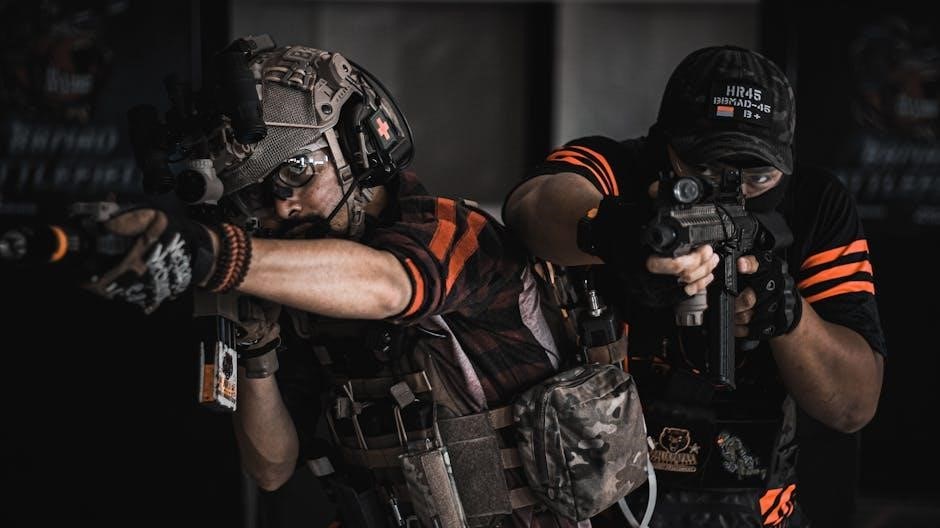
Ethical and Moral Responsibilities
Soldiers must uphold ethical standards, adhere to codes of conduct, and make morally sound decisions, especially in challenging combat situations.
5.1. Moral Obligations of Soldiers
Soldiers have a moral duty to act with integrity, respecting human rights and upholding ethical standards. Their actions must reflect loyalty, justice, and compassion, fostering trust within teams and with civilians. Adhering to these principles ensures they serve as responsible representatives of their nation, even in challenging environments.
5.2. Adherence to Military Code of Conduct
Soldiers must strictly adhere to the military code of conduct, ensuring compliance with ethical standards and legal obligations. This code guides their actions during combat and peace, emphasizing integrity, accountability, and respect for human rights. By upholding these principles, soldiers maintain public trust and foster a disciplined, professional force. Violations of the code can lead to severe consequences, underscoring the importance of ethical behavior in all military operations.
5.3. Ethical Decision-Making in Combat
In high-stress combat situations, soldiers must make swift, ethical decisions that align with military codes and moral principles. These decisions often involve balancing mission objectives with the protection of civilians and adherence to international laws. Ethical failures can erode trust and lead to severe consequences, both legally and morally. Soldiers are trained to prioritize human rights, minimize harm, and act with integrity, ensuring their actions reflect the values of their nation and military. Leadership plays a critical role in guiding these decisions and fostering a culture of accountability.
The Role of Soldiers in Peacekeeping Missions
Soldiers in peacekeeping missions maintain global stability, protect civilians, and facilitate conflict resolution. They operate under international mandates, ensuring security and promoting cooperation in volatile regions worldwide.
6.1. Contributions to Global Peacekeeping Efforts
Soldiers play a crucial role in global peacekeeping by providing security, supporting humanitarian aid, and protecting vulnerable populations. They contribute to conflict resolution, stabilize regions, and facilitate dialogue. By maintaining order, soldiers enable the delivery of essential services and aid, fostering trust and cooperation among communities. Their presence helps prevent escalation of violence, ensuring safe environments for displaced persons and refugees. Through these efforts, soldiers uphold international peace and security, making significant contributions to global stability and humanitarian relief efforts worldwide.
6.2. Challenges Faced in Peacekeeping Operations
Soldiers in peacekeeping missions face complex challenges, including diverse mandates, resource constraints, and hostile environments. They must navigate unpredictable situations, ensuring safety while maintaining neutrality. Logistical difficulties, such as operating in remote areas with limited infrastructure, complicate operations. Cultural and linguistic barriers can hinder communication and cooperation with local populations. Additionally, soldiers must adapt to dynamic threats, balancing security with humanitarian objectives. These challenges require resilience, adaptability, and a deep commitment to achieving peacekeeping goals despite significant operational and ethical complexities. Their efforts are critical to maintaining global stability and protecting vulnerable communities.
6.3. Humanitarian Roles of Soldiers
Beyond combat, soldiers play vital humanitarian roles, providing aid in crises. They distribute supplies, assist refugees, and rebuild infrastructure. Their efforts in disaster relief and conflict zones save lives, fostering trust and stability. Soldiers also engage in community service, promoting goodwill. These actions demonstrate their commitment to protecting humanity and upholding global peace, showcasing the military’s compassionate side in addressing human suffering and supporting vulnerable populations worldwide.
Soldier Responsibilities in Different Military Branches
Soldiers’ duties vary by branch, with the Army focusing on land operations, Navy on sea missions, and Air Force on aerial duties, all ensuring national security.
7.1. Army Roles and Missions
The Army’s primary role is to protect national interests through land-based military operations. Soldiers engage in combat, peacekeeping, and humanitarian missions, ensuring global stability. Key responsibilities include tactical employment, training, and leadership. The Army focuses on large-scale ground operations, providing forces to combat threats and support allies. Soldiers also participate in disaster relief and civil support, demonstrating versatility in their duties. Their missions emphasize defending freedom, upholding national security, and maintaining order worldwide, making the Army a cornerstone of defense and humanitarian efforts.
7.2. Navy and Marine Corps Responsibilities
The Navy focuses on sea-based operations, ensuring maritime security and power projection. Sailors conduct missions to deter threats, protect sea lanes, and support land operations. The Marine Corps specializes in ground combat, rapid deployment, and amphibious assaults. Marines are trained for expeditionary missions, focusing on speed and versatility. Both branches collaborate in joint operations, with the Navy providing logistical support and the Marine Corps delivering ground forces. Their roles are crucial for national defense, adaptability, and strategic global presence, ensuring security across multiple domains.
7.3. Air Force and Coast Guard Duties
The Air Force specializes in air superiority, conducting missions to defend airspace and support ground operations with precision strikes and intelligence. Airmen manage advanced technology, logistics, and communications. The Coast Guard focuses on maritime security, search and rescue, and environmental protection. Coast Guardsmen enforce laws at sea, prevent smuggling, and respond to disasters. Both branches play vital roles in national security, often collaborating in joint operations. Their duties require adaptability, technical expertise, and a commitment to protecting lives and resources in diverse environments.
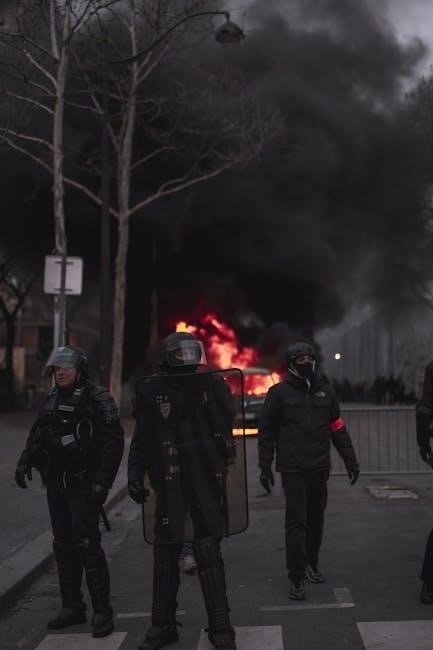
The Daily Life of a Soldier
Soldiers follow a rigorous routine, balancing discipline, physical training, and mental challenges. Their days involve drills, patrols, and maintaining readiness while managing personal and professional responsibilities diligently.
8.1. Routine and Discipline in Military Life
Soldiers adhere to a strict daily schedule, emphasizing discipline and adherence to protocols. Their routine includes drills, patrols, and maintaining equipment readiness. Discipline fosters accountability, ensuring tasks are executed efficiently. This structured lifestyle prepares soldiers for unpredictable situations, reinforcing their ability to follow orders and maintain cohesion. The military environment demands unwavering commitment to rules and procedures, which are essential for operational success and safety. This routine builds resilience and shapes their professional and personal character, enabling them to perform duties effectively under pressure.
8.2. Physical and Mental Challenges
Soldiers face rigorous physical demands, including endurance training and combat readiness. Mental challenges arise from stress, isolation, and high-pressure decision-making. These demands test resilience and adaptability, requiring soldiers to maintain focus and composure. Physical health risks, such as injuries, further complicate their duties. Mental well-being is crucial, as soldiers must balance personal life with professional obligations. The military environment fosters a culture of resilience, equipping soldiers to overcome these challenges and perform effectively in demanding situations. Their ability to endure physical and mental strain is vital to mission success and national security.
8.3. Balancing Personal and Professional Life
Soldiers often face challenges in balancing personal and professional life due to demanding duties and frequent deployments. Time management and support systems are crucial for maintaining relationships and mental well-being. Military resources, such as counseling and family support programs, help soldiers navigate these complexities. Balancing personal life with military responsibilities ensures soldiers remain resilient and focused, contributing to their effectiveness in service. This balance is essential for sustaining morale and overall mission success.

Civil-Military Relations
Civil-military relations focus on building trust and cooperation between soldiers and civilians. Soldiers support communities through outreach programs, fostering mutual respect and strengthening national bonds.
9.1. Interaction Between Soldiers and Civilians
Soldiers interact with civilians through community service, peacekeeping missions, and disaster relief. These interactions build trust and mutual respect, fostering strong civil-military relations. Soldiers often engage in outreach programs, providing aid and support to local populations. Their role in civil society includes maintaining order and ensuring safety, which enhances public perception of military personnel. Effective communication and cultural sensitivity are key to successful civilian-military collaboration, ensuring harmony and cooperation in diverse settings.
9.2. Role of Soldiers in Civil Society
Soldiers play a vital role in civil society by contributing to community development and public safety. They engage in outreach programs, disaster response, and educational initiatives, fostering trust and cooperation. Military personnel often support local populations during crises, providing aid and stability. Their involvement in civil projects, such as infrastructure development and healthcare assistance, strengthens societal bonds. Soldiers also serve as role models, promoting discipline and service to the community, which enhances their positive impact on civil society and national pride.
9.3. Public Perception of Military Personnel
Public perception of military personnel is often shaped by their role in protecting national security and engaging in community service. Soldiers are widely admired for their courage, discipline, and sacrifice. However, perceptions can vary based on societal values and media coverage. Many view soldiers as symbols of national pride and respect their commitment to service. Despite challenges, the military is generally seen as a trusted institution, with soldiers embodying values of loyalty and duty. Their contributions to society foster a positive image, reinforcing their importance in both defense and civil roles.
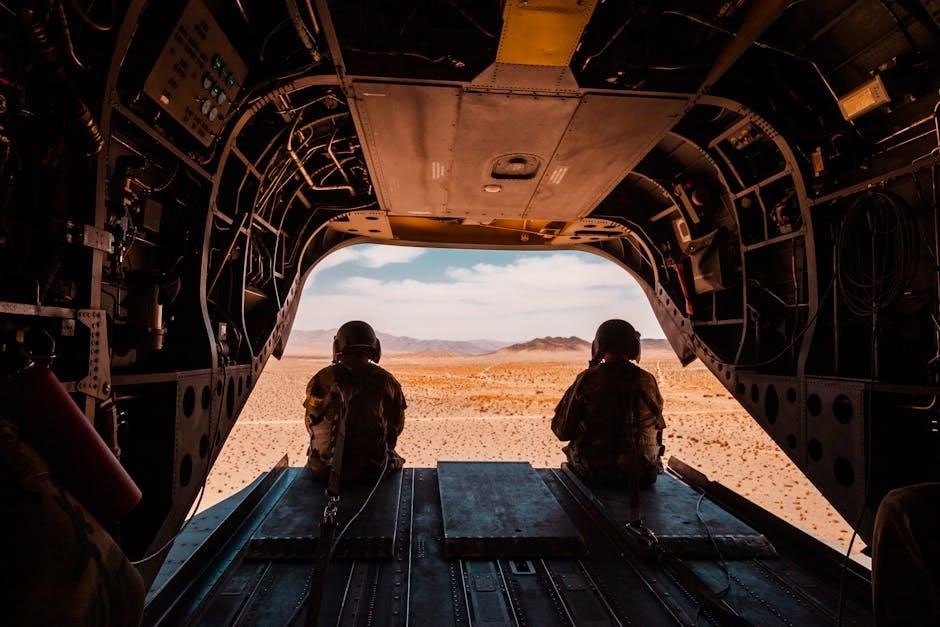
Soldier Contributions to Society
Soldiers contribute to society through disaster response, community service, and national security. Their roles include protecting citizens, supporting humanitarian efforts, and fostering national pride, ensuring societal stability and safety.
10.1. Community Service and Outreach Programs
Soldiers actively engage in community service, fostering trust and support between the military and civilians. Programs include mentoring youth, participating in disaster relief, and organizing health clinics. These efforts strengthen societal bonds and demonstrate the military’s commitment to public welfare. Soldiers also volunteer in educational initiatives, promoting literacy and skill development. Such outreach builds mutual respect and understanding, while enhancing the military’s role as a positive force within communities. These activities reflect the soldier’s dedication to serving both in and out of uniform.
10.2. Disaster Response and Relief Efforts
Soldiers play a critical role in disaster response, providing immediate assistance during crises like earthquakes, hurricanes, and floods. They conduct search and rescue operations, deliver essential supplies, and establish temporary infrastructure. Military personnel also offer medical aid and logistical support, ensuring affected communities receive timely help. Their training enables them to operate effectively in chaotic environments, restoring order and safety. Soldiers’ efforts during disasters not only save lives but also rebuild communities, demonstrating their commitment to protecting and serving the public in times of need.
10.3. Promoting National Security and Pride
Soldiers are pillars of national security, defending sovereignty and fostering pride through their unwavering dedication. Their service ensures safety, stability, and freedom, inspiring patriotism among citizens. By upholding democratic values and safeguarding against threats, soldiers strengthen national identity. Their sacrifices and achievements are celebrated, reinforcing societal respect for the military. Soldiers embody the nation’s strength and resilience, contributing to a collective sense of security and unity. Their role in protecting the homeland fosters enduring pride and gratitude, making them integral to the nation’s fabric.
Soldiers play a vital role in safeguarding nations, upholding freedom, and inspiring pride through their selfless service and unwavering commitment to protecting humanity and global peace.
11.1. Summary of Soldier Roles and Responsibilities
Soldiers fulfill diverse roles, from combat and tactical operations to peacekeeping and humanitarian efforts. They are responsible for protecting national security, adhering to ethical standards, and inspiring trust. Leadership roles, such as platoon and squad leaders, emphasize team management and mission success. Continuous training ensures skill development and readiness. Soldiers also contribute to civil society through community service and disaster relief, embodying selfless service and discipline. Their duties require resilience, moral integrity, and a commitment to safeguarding freedom and global stability, making their role indispensable to societal well-being and national pride.
11.2. The Significance of Military Service
Military service holds profound significance, fostering national security, personal growth, and societal impact. Soldiers embody courage, discipline, and patriotism, safeguarding freedom and global stability. Their role extends beyond combat, contributing to peacekeeping, disaster relief, and community service. Through their service, soldiers build resilience and leadership skills, shaping future generations. The military fosters trust and unity, epitomizing selfless dedication. Their efforts protect democratic values, ensuring a safer world and inspiring national pride, making military service a cornerstone of societal strength and moral integrity, vital for enduring peace and prosperity.
11.3. Future of Soldier Duties and Responsibilities
The future of soldier duties will evolve with advancing technologies and global challenges. Soldiers will increasingly engage in cybersecurity, artificial intelligence, and robotics. Their roles will expand to address climate change, humanitarian crises, and asymmetric warfare. Leadership and adaptability will remain critical as soldiers operate in dynamic, unpredictable environments. Continuous education and training will be essential to meet emerging threats and technological demands. The military must foster innovation while maintaining core values of discipline and service, ensuring soldiers are prepared to safeguard global peace and security in an ever-changing world.